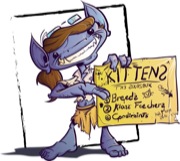
Wishlists and Lists
Wishlists allow you to track products you'd like to buy, or—if you make a wishlist public—to have others buy for you.
Lists allow you to track products, product categories, blog entries, messageboard forums, threads, and posts, and even other lists! For example, see Lisa Stevens' items used in her Burnt Offerings game sessions.
For more details about wishlists and lists, see this thread.